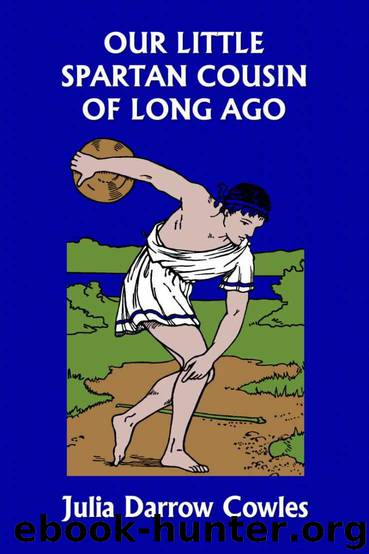Our Little Spartan Cousin of Long Ago (Yesterday's Classics) by Cowles Julia Darrow

Author:Cowles, Julia Darrow [Cowles, Julia Darrow]
Language: eng
Format: epub
Tags: Juvenile Fiction
ISBN: 9781599152844
Publisher: Yesterday's Classics
Published: 2010-11-08T22:34:22.429000+00:00
CHAPTER X
A Vacancy Filled
THE next few days were days of intense excitement for the boys. They were preparing for the war game in which two companies of Spartan boys took part each year. It had been announced that the companies of Orestes and Procles had been chosen for the conflict. In no other state than Sparta would this have been called a game.
Early upon the day appointed, a sacrifice was made upon one of the altars, and then the two companies of boys, to the music of the cithara and the fife, marched away from the city to an island which had been made ready for them. This island was formed by ditches filled with water, and it was reached by two bridges upon opposite sides. One was called the bridge of Herakles, and was guarded by an image of this hero-god. The other was the bridge of Lycurgus, with its image of Sparta's great law-giver. Orestes' company crossed the bridge of Herakles; Procles' company the bridge of Lycurgus, and, facing each other, they stood, quivering with excitement; eager to show their courage and endurance.
The citizens and boys of Sparta had followed the two companies, and now surrounded the island, intent upon the outcome of the conflict.
The struggle began by wrestling, but as one opponent or another was thrown, a fury seemed to seize the boys. It was no longer a wrestling contest; it became a hand-to-hand struggle; a war of strength and physical endurance.
We, of to-day, can scarcely understand how such a contest among boys could have received the approval of sober-minded men; but the Spartans despised pain and honored physical hardihood. That they should have given so great a degree of honor to mere physical courage, is the chief reproach that has been brought against the Spartans. The moral, as well as physical, courage which made them die in battle rather than let a foreign army take possession of their lands and their homes, was altogether different from this.
When Orestes, with his victorious company of boys, marched back to the city, they bore grim evidence of their sturdy fighting in the war game which Spartan custom endorsed;—but Ceos, with his ready fun, was not with them, nor would he be again.
The older men, however, as they marched back to the city, said tersely, "The best survive."
The days that followed were filled as usual, for the boys, with exercises in the gymnasium; with tasks which took them to the mountains, to the river, and out into the farming country; and with lessons in music and the study of Homer.
The poems of Homer—the Iliad and the Odyssey—stirred the enthusiasm of the boys, not only because they told of wars and strange adventures, but because Helen, of whom the Iliad told, was stolen away from Sparta, and from her husband, Menelaus, who was one of Sparta's early kings.
The lessons in singing were of great importance. The boys were not taught to sing alone, so much as in chorus. They were trained by one of the older men of the city under the superintendence of an ephor, or magistrate.
Download
This site does not store any files on its server. We only index and link to content provided by other sites. Please contact the content providers to delete copyright contents if any and email us, we'll remove relevant links or contents immediately.
| Africa | Ancient Civilizations |
| Europe | Exploration & Discoveries |
| Holocaust | Medieval |
| Military & Wars | Prehistory |
| Renaissance | United States |
Among the Betrayed by Margaret Peterson Haddix(11045)
05 Trials of Death by Darren Shan(5825)
Ranger's Apprentice 1 - The Ruins of Gorlan by John Flanagan(5357)
The Power of Now: A Guide to Spiritual Enlightenment by Eckhart Tolle(4752)
Suicide Notes by Michael Thomas Ford(4271)
Percy Jackson 1 - The Lightning Thief by Riordan Rick(4240)
I'm Still Scared by Tomie dePaola(3912)
Pocahontas by Joseph Bruchac(3721)
The miraculous journey of Edward Tulane by Kate DiCamillo(3594)
The Book Thief by Markus Zusak(3437)
07 Hunters of the Dusk by Darren Shan(3180)
The 101 Dalmatians by Dodie Smith(2933)
The Science Book (Big Ideas Simply Explained) by DK(2744)
Winnie_The_Pooh by A. A. Milne(2429)
Harry Potter 4 - Harry Potter and The Goblet of Fire by J.K.Rowling(2416)
The Ring of Sky by Chris Bradford(2410)
The Little Prince by Antoine de Saint-Exupéry(2348)
The Wrath and the Dawn by Ahdieh Renee(2308)
The Rose and the Dagger (The Wrath and the Dawn) by Renée Ahdieh(2269)
